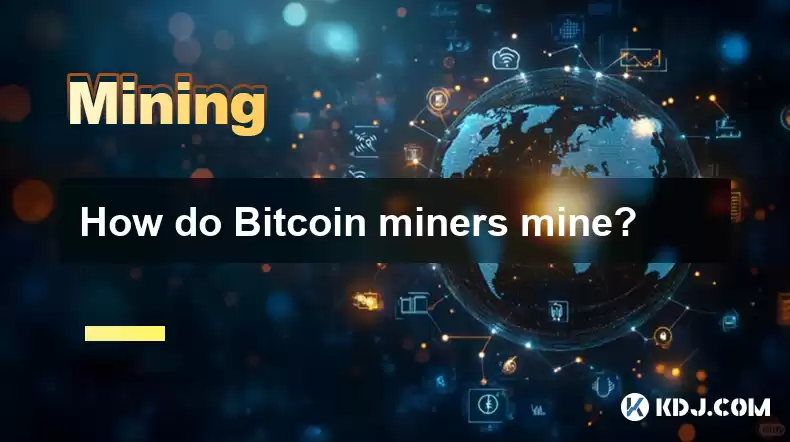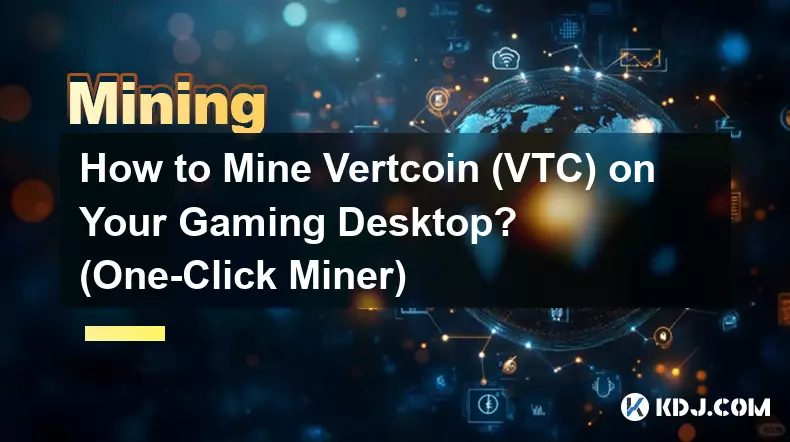-
 bitcoin
bitcoin $87959.907984 USD
1.34% -
 ethereum
ethereum $2920.497338 USD
3.04% -
 tether
tether $0.999775 USD
0.00% -
 xrp
xrp $2.237324 USD
8.12% -
 bnb
bnb $860.243768 USD
0.90% -
 solana
solana $138.089498 USD
5.43% -
 usd-coin
usd-coin $0.999807 USD
0.01% -
 tron
tron $0.272801 USD
-1.53% -
 dogecoin
dogecoin $0.150904 USD
2.96% -
 cardano
cardano $0.421635 USD
1.97% -
 hyperliquid
hyperliquid $32.152445 USD
2.23% -
 bitcoin-cash
bitcoin-cash $533.301069 USD
-1.94% -
 chainlink
chainlink $12.953417 USD
2.68% -
 unus-sed-leo
unus-sed-leo $9.535951 USD
0.73% -
 zcash
zcash $521.483386 USD
-2.87%
How do Bitcoin miners mine?
As Bitcoin mining competition intensifies, miners leverage specialized hardware and collaborate in mining pools to increase their chances of earning rewards and transaction fees while facing scrutiny over energy consumption concerns.
Jan 13, 2025 at 01:37 am

- Bitcoin mining involves solving complex mathematical puzzles to validate transactions and create new blocks.
- Miners use specialized hardware, such as ASICs, with high computing power to earn rewards in the form of Bitcoin and transaction fees.
- The difficulty of mining adjustments over time to ensure a consistent block time.
- Energy consumption is a significant consideration for Bitcoin mining operations.
- Mining pools combine resources for increased profitability and stability.
- Setup and Hardware Selection:
- Bitcoin miners acquire specialized hardware, typically ASIC (Application-Specific Integrated Circuit) chips, designed specifically for mining.
- These ASICs possess high computational power, allowing them to solve the complex mathematical equations required for mining.
- Miners also require a wallet to store their rewards and a mining software to interface with the blockchain.
- Joining a Mining Pool:
- Solo mining, where an individual miner solves blocks independently, is becoming increasingly challenging due to high competition.
- Miners often join mining pools, which combine resources to increase processing power and chances of finding a block.
- Pools share the rewards among participants based on their contributions.
- Receiving Transactions:
- Mining nodes receive unconfirmed Bitcoin transactions, known as the mempool.
- They verify the transactions, ensuring they are valid and follow the Bitcoin protocol.
- Block Creation:
- Miners assemble valid transactions into a block, along with a reference to the previous block in the blockchain.
- They solve a complex computational problem, known as the "proof-of-work," to generate a hash for the block.
- The hash must meet specific difficulty requirements set by the Bitcoin protocol.
- Block Broadcasting:
- Once a miner successfully solves the proof-of-work, they broadcast the block to the network.
- Other miners receive the block and verify its validity, checking the transactions and the proof-of-work.
- Block Reward and Transaction Fees:
- If a miner's block is validated and accepted by the network, they receive a reward in the form of new Bitcoin.
- Miners also earn transaction fees attached to the transactions included in their block.
- Difficulty Adjustment:
- The Bitcoin protocol automatically adjusts the mining difficulty based on the number of miners participating and the time elapsed since the last block was found.
- This ensures that the average block time remains roughly consistent over time.
- Bitcoin mining consumes significant amounts of energy due to the computational requirements involved.
- Miners rely on electricity to power their ASICs and cooling systems.
- Governments have expressed concerns about the environmental impact of Bitcoin mining, leading to scrutiny and regulatory efforts.
- Some miners have turned to renewable energy sources to mitigate their impact on the environment.
- What is the difficulty of Bitcoin mining?The difficulty of Bitcoin mining is adjusted every 2016 blocks (approximately every 2 weeks) to maintain a stable block time of 10 minutes. As more miners join the network, the difficulty increases to keep the average block time consistent.
- How much does it cost to mine Bitcoin?The cost of mining Bitcoin depends on factors such as the price of electricity, hardware expenses, and pool fees. As of July 2023, the estimated production cost is around $13,000 per Bitcoin.
- Can I mine Bitcoin at home?While technically possible, mining Bitcoin at home with consumer hardware is not profitable. Specialized ASICs and efficient electricity consumption are essential for viable mining operations.
- What is the impact of Bitcoin mining on the environment?Bitcoin energy consumption is a significant concern due to the high computing power used by ASICs. However, the Bitcoin network is exploring ways to reduce its environmental impact, such as promoting renewable energy sources and developing more efficient mining hardware.
- What is the future of Bitcoin mining?The future of Bitcoin mining remains uncertain. Regulatory measures, technological advancements, and energy considerations will continue to shape its evolution. Innovations in alternative consensus mechanisms and energy-efficient mining practices may influence the mining landscape.
Disclaimer:info@kdj.com
The information provided is not trading advice. kdj.com does not assume any responsibility for any investments made based on the information provided in this article. Cryptocurrencies are highly volatile and it is highly recommended that you invest with caution after thorough research!
If you believe that the content used on this website infringes your copyright, please contact us immediately (info@kdj.com) and we will delete it promptly.
- Big Apple Bets: Ripple Takes Europe, Google Stumbles in Seoul – A Global Payments Tug-of-War
- 2026-02-03 01:20:02
- Bitcoin Futures Face Fresh Collapse Concerns as Market Nerves Fray
- 2026-02-03 01:10:01
- Ozark AI Ignites Crypto Buzz: Strategic Listings Fueling 700x Price Acceleration Talk
- 2026-02-03 01:20:02
- Bitcoin Price Dips Below $80,000, Sparking Market Sell-Off and Liquidations
- 2026-02-03 01:10:01
- Rome's Trevi Fountain: A Two-Euro Ticket to Taming the Crowds
- 2026-02-03 01:00:02
- Justin Sun's $100 Million Bitcoin Bet: A Contrarian Play Amidst Crypto Winter
- 2026-02-03 01:15:02
Related knowledge

How to Spot a Cloud Mining Scam? (Red Flags to Watch For)
Feb 02,2026 at 08:20am
Unrealistic Return Promises1. Platforms advertising guaranteed daily returns above 1–2% without disclosing underlying hardware, electricity costs, or ...

How to Set Up a Multi-Coin Mining Farm? (Scalability Tips)
Feb 03,2026 at 12:59am
Hardware Selection Strategy1. Choose ASIC miners based on coin-specific algorithm compatibility—SHA-256 for Bitcoin, Scrypt for Litecoin, and Ethash o...

How to Earn Passive Income with DePIN Mining? (New Trend 2026)
Feb 01,2026 at 12:40pm
Understanding DePIN Mining Mechanics1. DePIN mining relies on real-world infrastructure participation rather than computational hashing. Users deploy ...

How to Re-paste Your Mining GPUs to Lower Temps? (Maintenance)
Feb 03,2026 at 12:00am
Understanding Thermal Interface Material Degradation1. Over time, thermal paste on GPU dies dries out, cracks, or separates from the die surface due t...

How to Mine Flux (FLUX) and Support Web3? (Node Mining)
Feb 03,2026 at 02:20am
Understanding FLUX Node Mining1. FLUX node mining operates through a decentralized infrastructure layer built on the ZelCore platform, enabling partic...

How to Mine Vertcoin (VTC) on Your Gaming Desktop? (One-Click Miner)
Feb 02,2026 at 03:39am
Understanding Vertcoin's Mining Algorithm1. Vertcoin uses the Verthash algorithm, which is intentionally memory-hard and designed to resist ASIC domin...

How to Spot a Cloud Mining Scam? (Red Flags to Watch For)
Feb 02,2026 at 08:20am
Unrealistic Return Promises1. Platforms advertising guaranteed daily returns above 1–2% without disclosing underlying hardware, electricity costs, or ...

How to Set Up a Multi-Coin Mining Farm? (Scalability Tips)
Feb 03,2026 at 12:59am
Hardware Selection Strategy1. Choose ASIC miners based on coin-specific algorithm compatibility—SHA-256 for Bitcoin, Scrypt for Litecoin, and Ethash o...

How to Earn Passive Income with DePIN Mining? (New Trend 2026)
Feb 01,2026 at 12:40pm
Understanding DePIN Mining Mechanics1. DePIN mining relies on real-world infrastructure participation rather than computational hashing. Users deploy ...

How to Re-paste Your Mining GPUs to Lower Temps? (Maintenance)
Feb 03,2026 at 12:00am
Understanding Thermal Interface Material Degradation1. Over time, thermal paste on GPU dies dries out, cracks, or separates from the die surface due t...

How to Mine Flux (FLUX) and Support Web3? (Node Mining)
Feb 03,2026 at 02:20am
Understanding FLUX Node Mining1. FLUX node mining operates through a decentralized infrastructure layer built on the ZelCore platform, enabling partic...

How to Mine Vertcoin (VTC) on Your Gaming Desktop? (One-Click Miner)
Feb 02,2026 at 03:39am
Understanding Vertcoin's Mining Algorithm1. Vertcoin uses the Verthash algorithm, which is intentionally memory-hard and designed to resist ASIC domin...
See all articles










































































